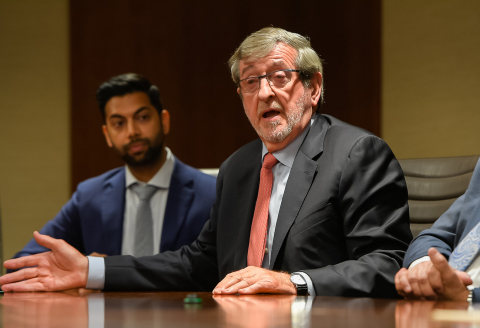WASHINGTON--(BUSINESS WIRE)--With deaths and injuries from shootings spiking nationwide, 18 of the nation’s most prominent health system CEOs and more than 1,300 health care professionals across America have sent an urgent request to Congressional leaders, asking them to support President Biden’s plan to invest $5 billion in hospital- and community-based gun violence intervention programs. In a rare call to action by health care leaders whose hospitals were inundated by victims of COVID-19, the health professionals warned that gun violence poses an equally urgent public health crisis that requires the same vigorous response. Combined, the CEOs run health systems that employ over 700,000 health care professionals nationwide.
“From trauma bays to operating rooms, health care professionals see the breadth and severity of the gun violence crisis in stark terms,” said Michael Dowling, president & CEO of Northwell Health in New York. “We have a responsibility to respond and protect the health of our patients and communities -- but to do that most effectively, we need Congress to help us do our jobs. Addressing gun violence isn't a Republican issue or Democratic issue -- it's a public health issue.”
The plea from America’s health care CEOs and caretakers -- which was sent to Senate Majority Leader Charles Schumer, House Speaker Nancy Pelosi, Senate Minority Leader Mitch McConnell, and House Minority Leader Kevin McCarthy -- was the result of a grassroots effort led by Mr. Dowling, Chethan Sathya, MD, the director of Northwell’s Center for Gun Violence Prevention, and Joseph Sakran, MD, a gun violence survivor, trauma surgeon and director of emergency general surgery at The Johns Hopkins Hospital in Baltimore. Through their advocacy, they helped galvanize health leaders across America to urge Congressional support of hospital- and community-based violence intervention programs (HVIPs). These programs enable health care professionals to screen non-fatal gunshot patients to identify those at greatest risk for re-injury and connect them with support services, including trauma-informed care, job training, and housing.
Many health systems are already taking steps to implement intervention programs. In some cities, as many as 45% of patients with a history of violent injury return with another injury within the next five years. But programs dedicated to intervening at this critical juncture have a proven track record of success. A HVIP in Baltimore, for example, saw the injury recidivism rate for patients fall to as low as 5%. Utilizing a $1.2 million grant from the National Institutes of Health, Northwell Health is screening patients for gun violence risk. Gun owners are counseled about safe firearms practices and high-risk individuals are connected to support services.
“Gun violence is a pressing public health crisis and racial equity issue that requires a public health response,” said Fatimah Loren Dreier, executive director of the Health Alliance for Violence Intervention. “That’s why investing in hospital- and community-based interventions that address the underlying drivers of violence is so important and impactful.”
The funding request comes as gun violence in America reaches crisis levels. Last year, the U.S. experienced a record 43,559 firearms-related deaths and more than 39,000 additional injuries -- and the nation is on pace this year to surpass that grim milestone. That’s more than the number of Americans who die from high blood pressure, malnutrition, HIV, Parkinson's disease, and viral hepatitis. Like many of those diseases, gun violence disproportionately impacts communities of color. For example, gun violence is the leading cause of death for young Black men in America – accounting for more deaths than the next nine leading causes combined.
Many of the signers of the letter to Congressional leaders are already participants in a “Learning Collaborative” established this spring by Northwell’s Center for Gun Violence Prevention to share and develop best practices for preventing firearm injury and death.




